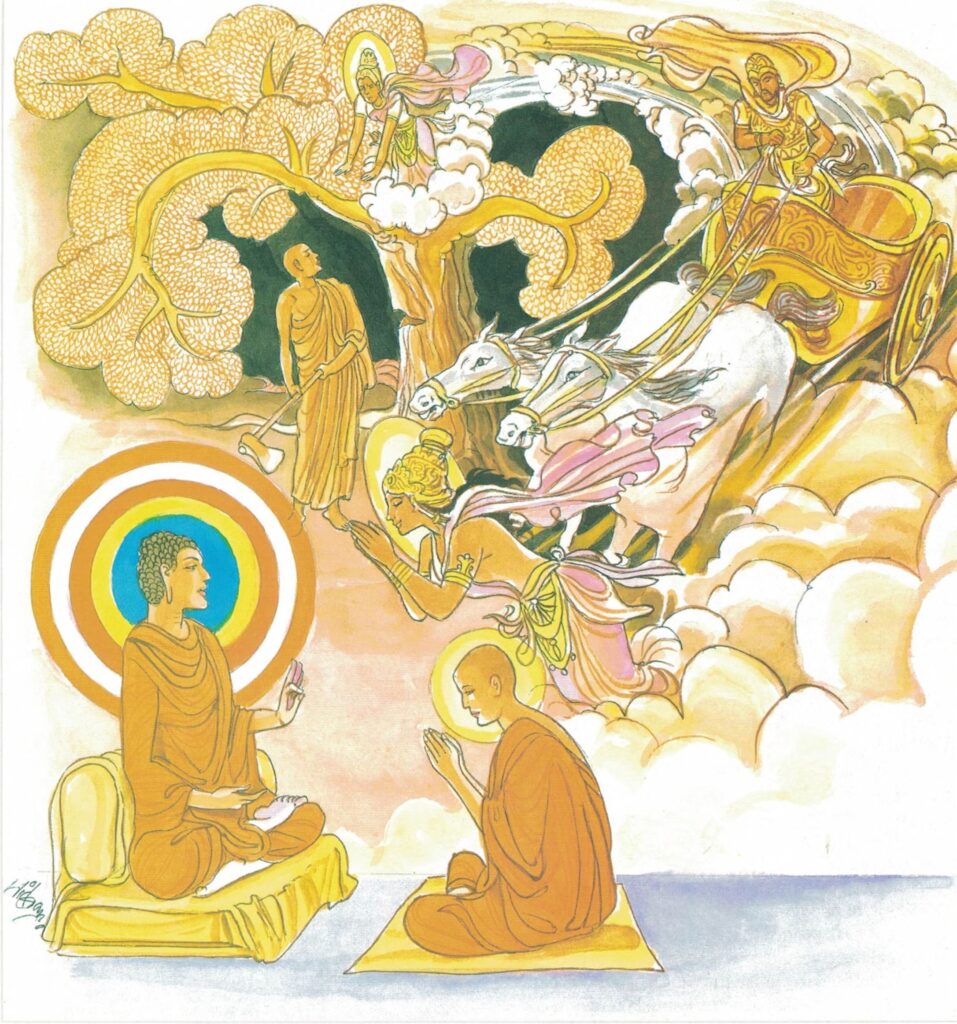Pali text, illustration and English translation of Dhammapada verse 222:
yo ve uppatitaṃ kodhaṃ rathaṃ bhantaṃ va dhāraye |
tam’ahaṃ sārathiṃ brūmi rasmiggāho itaro jano || 222 ||
222. Who checks arising anger as with chariot away, that one I call a charioteer, others merely grip the reins.

The Story of a Monk
While residing at the Aggāḷava Stupa in the city of Ālavi, the Buddha spoke this verse with reference to a monk.
For after the Buddha had given permission to the congregation of monks to lodge outside the walls of the Monastery, and while the treasurer of Rājagaha and others were busy providing such lodgings, a certain monk of Ālavi decided to build himself a lodging, and seeing a tree which suited him, began to cut it down. Thereupon a certain spirit who had been reborn in that tree, and who had an infant child, appeared before the monk, carrying her child on her hips, and begged him not to cut down the tree, saying, “Master, do not cut down my home;it will be impossible for me to take my child and wander about without a home.” But the monk said, “I shall not be able to find another tree like this,” and paid no further attention to what she said. The tree-spirit thought to herself, “If he but looks upon this child, he will desist,” and placed the child on a branch of the tree. The monk, however, had already swung his axe, was unable to check the force of his upraised axe, and cut off the arm of the child. Furious with anger, the tree-spirit raised both her hands and exclaimed, “I will strike him dead.” In an instant, however, the thought came to her, “This monk is a righteous man; if I kill him, I shall go to hell. Moreover, if other treespirits see monks cutting down their own trees, they will say to themselves, ‘Such and such a tree-spirit killed a monk under such circumstances,’ and will follow my example and kill other monks. Besides, this monk has a master; I will therefore content myself with reporting this matter to his master.”
Lowering her upraised hands, she went weeping to the Buddha, and having saluted him, stood on one side. Said the Buddha, “What is the matter, tree-spirit?” The tree-spirit replied, “Venerable, your disciple did this and that to me. I was sorely tempted to kill him, but I thought this and that, refrained from killing him, and came here.” So saying, she told him the story in all its details. When the Buddha heard her story, he said to her, “Well done, well done, spirit! You have done well in holding in, like a swift-speeding chariot, your anger when it was thus aroused.”
At the conclusion of the lesson the tree-spirit was established in the fruit of conversion; the assembled company also profited by it. But even after the tree-spirit had obtained the fruit of conversion, she stood weeping. The Buddha asked her, “What is the matter, tree-spirit?” “Venerable,” she replied, “my home has been destroyed; what am I to do now?” Said the Buddha, “Enough, tree-spirit; be not disturbed; I will give you a place of abode.” With these words he pointed out near the perfumed chamber of Jetavana a certain tree from which a tree-spirit had departed on the preceding day and said, “In such and such a place is a tree which stands by itself; enter therein.” Accordingly the tree-spirit entered that tree. Thenceforth, because the tree-spirit had received her place of abode as a gift from the Buddha, although spirits of great power approached that tree, they were unable to shake it. The Buddha used this occasion to enjoin upon the monks and lay down the observance of the precept regarding the injuring of plants and trees.
Explanatory Translation (Verse 222)
yo ve uppatitaṃ kodhaṃ bhantaṃ rathaṃ iva dhāraye
taṃ ahaṃ sārathiṃ brūmi itaro jano rasmiggāho
yo: if a person; ve: certainly; uppatitaṃ kodhaṃ [kodha]: arisen anger; bhantaṃ rathaṃ iva: like an uncontrolled chariot; dhāraye: restrains; taṃ: him; ahaṃ: I; sārathiṃ brūmi: call a charioteer; itaro jano: the other (kind of charioteer); rasmiggāho [rasmiggāha]: is a mere reins-holder
That person who is capable of curbing sudden anger is like the expert charioteer who restrains a chariot rushing out of control. That person I describe as a true charioteer. The other type of charioteer is a mere holder of the reins.
Commentary and exegetical material (Verse 222)
uppatitaṃ kodhaṃ: arisen anger. most men are prone to anger. Their tendency to become angry stems from a variety of sources. All men have suffered wrong treatment themselves, and all bear the scars. Many people have had their childhood marred and their characters warped. We are striving for health of mind ourselves from a similarly imperfect past. Health of mind will spread to others as readily as wrong thought. In any case, the Path can never be trodden to the goal until all such wrong attitudes of mind have been superseded, therefore, however often we fail, let us freely admit the failure and go on striving.
Certain creatures cannot see in the day time whilst some others are blind at night. But a man driven to great heights of hatred does not observe anything, either by day or night. Buddha says: “Conquer anger by love, evil by good, the miserly by generosity and the liar by truth.” With whom and with what do you fight when you are angry. You fight with yourself, for you are the worst enemy of yourself. Mind is your best friend and worst foe. You must try to kill the passion of lust, hatred and ignorance that are latent in your mind by means of morality, concentration and wisdom.